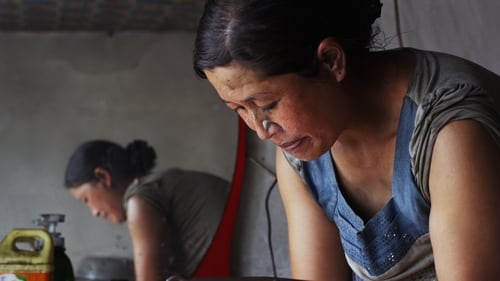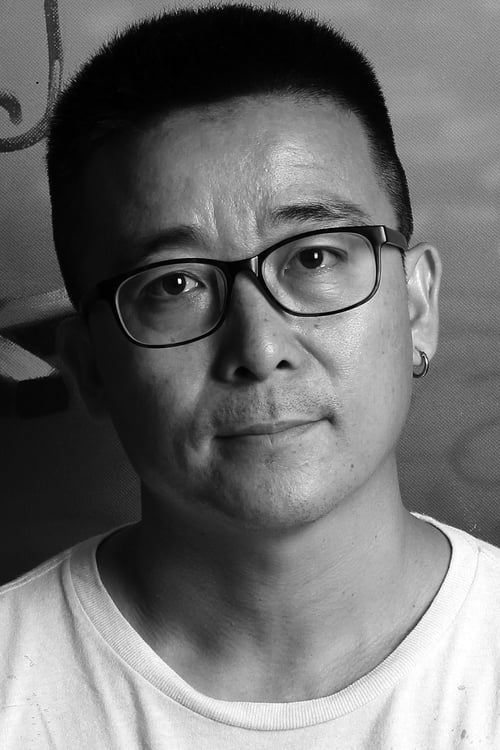Zhao Liang
출생 : 1971-01-01, Liaoning, China
약력
Zhao was born in Liaoning Province, and graduated from Luxun Academy of Fine Arts in 1992. He supported himself as a photographer while working on his early documentaries. Zhao's 2009 documentary Petition: The Court of the Complainants premiered at the Cannes Film Festival and is about aspects of the legal system in China. The film was shot over twelve years and details the plight of Chinese citizens traveling to Beijing to file complaints with the central government about local officials. His work focuses on global issues and contemporary art.

Director
In a quiet forest, a sign warns of radiation hazard. “Is this the past or the future?” muses the masked figure who appears like a kind of ghost in nuclear disaster areas. At a time when nuclear power may be re-emerging as an alternative to fossil fuels, this calmly observed and compelling tour takes us to places that may serve as a warning.

Director
An Atonal commissioned video work from acclaimed Chinese filmmaker Zhao Liang was shot on-site in Chernobyl, northern Ukraine. The work focuses on Maria - in her 50s when the nuclear disaster occurred in Chernobyl. As her village was within 30 kilometres of the restricted area, she and her neighbours were forbidden to live in their own homes and instead sent to far away places. Maria along with several sisters secretly returned to their village to live a self-sufficient life. When Liang met Maria, she was over eighty years old, and she was left alone in the village. The sisters who had secretly returned with her had died. He re-edited the contents of the interviews with the characters in Svetlana Alexievich’s Voices from Chernobyl, and created a situation in which the inner echo of the elderly shows the deep pain and irreparable trauma to the human race caused by nuclear tragedy.

Cinematography
구약 성서에서, 산은 베헤모스라는 이름의 괴수가 거주하는 곳이다. 현대에 와서는 거대한 광산 기업들이 괴수의 공간을 차지했다. 단테의 『신곡』에서 영감을 받은 감독은 보이스오버를 통해 지옥으로 변해버린 중국의 낙원 찾기에 대한 그의 시적인 성찰을 공유한다. 전설 속의 괴수는 한 번이라도 이런 꿈을 꾼 적이 있었을까? (2016년 제13회 서울환경영화제)

Director
구약 성서에서, 산은 베헤모스라는 이름의 괴수가 거주하는 곳이다. 현대에 와서는 거대한 광산 기업들이 괴수의 공간을 차지했다. 단테의 『신곡』에서 영감을 받은 감독은 보이스오버를 통해 지옥으로 변해버린 중국의 낙원 찾기에 대한 그의 시적인 성찰을 공유한다. 전설 속의 괴수는 한 번이라도 이런 꿈을 꾼 적이 있었을까? (2016년 제13회 서울환경영화제)

Director
Zhao Liang’s film portrays AIDS sufferers of both genders; they are all people with very different biographies. As if it wasn’t bad enough being infected by HIV, their suffering is compounded by the fact that in the People’s Republic of China the disease is hushed up and people living with AIDS are ostracised. In China, the public at large knows very little about the disease and most people associate the virus with promiscuity. This fear of discrimination forces most patients to hide the fact that they are positive. The AIDS sufferers in Zhao Liang’s film were willing to share their experiences with him. The filmmaker was able to make contact with them via internet support groups; he also visited children with Aids at a ‘red ribbon’ school; but above all, he talked to AIDS sufferers during the making of Gu Changwei’s film. It is their presence which lends Changwei’s film its particular authenticity.

Director
The dysfunctional Chinese justice system allows citizens with grievances against their local governments to petition the court to clear or correct their record. Yet in order to do so, the petitioners must travel to Beijing to file paperwork and wait an indefinite period to plead their case. Following the saga of a group of petitioners over the years of 1996 and 2008, Petition unfolds like a novel by Zola or Dickens. This was filmed surreptitiously from the point of view of the petitioners, and not the justice officials, the police, or those heavies sent by the municipalities.

Director
In a small town near China's North Korea border, a state police station exerts itself as a solicitous caretaker of the locals. As it goes out to catch criminals and punish them too, professionalism fades into the background.

Editor
Return to the Border is a documentary directed by Zhao Liang about his return to his hometown in China that borders the Yalu river and North Korea. The film presents deep insight into both the Chinese and North Korean societies and changes that have taken place over the last several decades.

Producer
Return to the Border is a documentary directed by Zhao Liang about his return to his hometown in China that borders the Yalu river and North Korea. The film presents deep insight into both the Chinese and North Korean societies and changes that have taken place over the last several decades.

Cinematography
Return to the Border is a documentary directed by Zhao Liang about his return to his hometown in China that borders the Yalu river and North Korea. The film presents deep insight into both the Chinese and North Korean societies and changes that have taken place over the last several decades.

Screenplay
Return to the Border is a documentary directed by Zhao Liang about his return to his hometown in China that borders the Yalu river and North Korea. The film presents deep insight into both the Chinese and North Korean societies and changes that have taken place over the last several decades.

Director
Return to the Border is a documentary directed by Zhao Liang about his return to his hometown in China that borders the Yalu river and North Korea. The film presents deep insight into both the Chinese and North Korean societies and changes that have taken place over the last several decades.

Producer
Zhao Liang’s City Scene shows a poetic portrait of China’s contemporary metropolises.

Editor
Zhao Liang’s City Scene shows a poetic portrait of China’s contemporary metropolises.

Cinematography
Zhao Liang’s City Scene shows a poetic portrait of China’s contemporary metropolises.

Screenplay
Zhao Liang’s City Scene shows a poetic portrait of China’s contemporary metropolises.

Director
Zhao Liang’s City Scene shows a poetic portrait of China’s contemporary metropolises.

Director
Paper Airplane is a feature-length documentary that looks at the breakdown of China’s socialist systems, which had previously provided jobs and security, now having turned to capitalism allows disenfranchised youths to fall into new lifestyles that sometimes involve the underworld of drugs.

Director
2000 short video work by Zhao Liang

Director
Using the format of music videos, Zhao films an actor running through the remnants of a traditional Beijing neighborhood that is in the process of being destroyed as a result of urban economic redevelopment.

Screenplay
SYNOPSIS Towards the end of 1989, several artists moved to an area near the ruins of Yuanmingyuan, the former Beijing Summer Palace. Farewell, Yuanmingyuan documents the trials and tribulations of the artists in their nubile makeshift community.

Cinematography
SYNOPSIS Towards the end of 1989, several artists moved to an area near the ruins of Yuanmingyuan, the former Beijing Summer Palace. Farewell, Yuanmingyuan documents the trials and tribulations of the artists in their nubile makeshift community.

Editor
SYNOPSIS Towards the end of 1989, several artists moved to an area near the ruins of Yuanmingyuan, the former Beijing Summer Palace. Farewell, Yuanmingyuan documents the trials and tribulations of the artists in their nubile makeshift community.

Sound
SYNOPSIS Towards the end of 1989, several artists moved to an area near the ruins of Yuanmingyuan, the former Beijing Summer Palace. Farewell, Yuanmingyuan documents the trials and tribulations of the artists in their nubile makeshift community.

Director
SYNOPSIS Towards the end of 1989, several artists moved to an area near the ruins of Yuanmingyuan, the former Beijing Summer Palace. Farewell, Yuanmingyuan documents the trials and tribulations of the artists in their nubile makeshift community.

Tiehan
Directed by Wenji Teng

With the fishermen's life on the southeastern coast in the early 1960s as its background, the film depicts a group of militia women who work both as fisher women and fighters defending their homes and the motherland.




